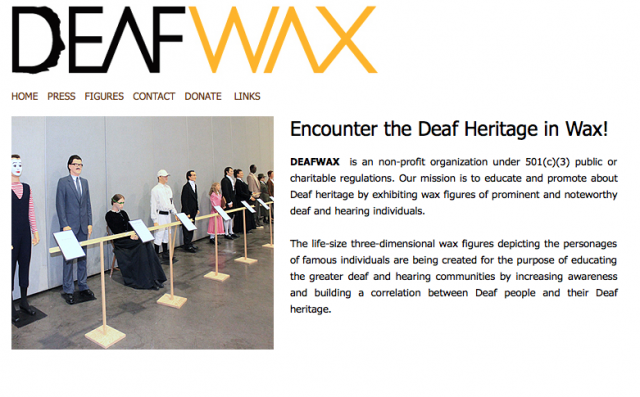Originally appeared in Silent News, January 2001.
Napanoch, NY – He stood in front of his peers, and created a poem out of the “S” handshape. He began with the birth of his daughter, and ended with being behind bars and becoming free.
A powerful message, especially coming from a deaf inmate incarcerated at the maximum security Eastern Correctional Facility in the scenic Catskills Mountains.
Peter Cook, nationally renowned American Sign Language (ASL) poet, along with his Flying Words Project partner Kenny Lerner, were invited to the Eastern Correctional Facility to give a three-day workshop to approximately 20 deaf prisoners on Nov. 28-30. The workshop, which focused on ASL poetry, culminated with a performance given by both deaf and hearing inmates to a diverse audience on Nov. 30, including Eastern Superintendent David Miller and Silent News.
This workshop, one of the first of its kind, came from an idea that Janine Pommy Vega had. Vega, one of the infamous Beat poets who has been associated with Allen Ginsberg and Jack Kerouac of the 1960s, had been working with hearing prisoners at the facility for several years, hosting poetry writing groups and even releasing a book, Voices Under The Harvest Moon. Vega learned from two inmates that there was a large deaf population at the facility. She began wondering if they couldn’t, too, benefit from a similar program. “I thought of their situation [of being deaf inside a prison], like being a ghetto inside of a ghetto. Any communication that bridged the gap between them and others would be a positive thing,” Vega said.
After some investigation and two years of trying to obtain a grant, Vega came to invite Cook and Lerner, who had already done some work with hearing prisoners at other facilities in the country.
Cook and Lerner arrived with very basic goals. “My main goal was to give the Deaf prisoners an opportunity to have a good time by playing with ASL. Also I had a hidden agenda that whatever they created and the other inmates, especially hearing inmates, would witness [the ASL] work and the interactions involved in the workshop would bring a new level of respect,” Cook said.
Lerner added, “Our goals were to teach the tools of techniques and literary devices that can be used in ASL poetry, and to build some bridges between deaf inmates and hearing inmates.”
Deaf prisoners learned how to use handshapes, humor, emotions, and life experiences in the workshop. They also worked together in groups to give both individual and group ASL poetry, both deaf and hearing. A common thread seen in many of the poems at the performance was quite personal themes. Lerner said, “A large number of the pieces they came up with seemed to center on freedom and children. Freedom is an obvious goal, but it was still striking to see it. Also, many of them had poems about children – themselves as children, parents whose children are behind bars, parents behind bars whose children are out there in the world – the people left behind.”
The performance opened with a welcome speech by Vega, who described a dream she had the night before about the performance. “When we witness someone communicate, really express something they’ve created or remembered, we are touched in the same way. In a way you could say every time we are touched, we are transformed.”
After more welcoming remarks from Superintendent Miller and Deputy Superintendent Sheryl Butler, Cook and Lerner performed several segments. The deaf and hearing inmates then performed individual and group poetry. There also was an impromptu reading by Alejo, a hearing inmate fluent in ASL. He had written the poem the night before after being inspired by the workshop. He was accompanied by Cook, who provided an improvised ASL version.
After the performance, a question and answer session was held for the audience. Many of the inmates in the audience were visibly affected by the experience and performance, as were the administrators and visitors present. One of the inmates asked Cook if he attended Gallaudet University. Cook answered that he had attended the National Technical Institute of the Deaf instead, but pointed out a Gallaudet alumna in the audience. The hearing inmate mentioned that he had played football against Gallaudet, and explained to the others about how the Bison drum would always throw the hearing players off-kilt during games.
One of the night’s highlights for Cook was a revival of a classic poem. “I was touched by a Deaf Afro-American inmate retelling Martin Luther King’s famous speech at the end of the performance. This was completely impromptu.” After Cook and Lerner performed “Old Wise Com,” a poem focusing on America’s naiveness during the civil rights movement of the 1960s, Cook noticed this inmate furiously waving his hands to gain Cook’s attention during a segment where Cook showed images of blacks being attacked by cops during riots. “After I finished my poem, the inmate continued to wave his hand, and I looked into his eyes. I knew he wanted to come on stage and recite the I Have a Dream speech. He was very emotional even though he was struggling with voicing and signing the speech. His face showed everything,” Cook remembered. “Imagine a Deaf Black man incarcerated in a maximum security prison telling us about that speech.”
“Any hearing person in the audience would have, it seems to me, been struck with the range and liveliness of signing as a language. The deaf were presented with more options for expression. This can only serve the community as a whole,” Vega said. “Communication is the glue that holds society together.”
Voices Under The Harvest Moon can be purchased through Small Press Distributors in Berkeley, CA. People outside the Bay Area may call 800-869-7553, or fax orders to (510) 524-0852, or e-mail orders@spdbooks.org.
Copyrighted material. This article can not be copied, reproduced, or redistributed without the written consent of the author.


